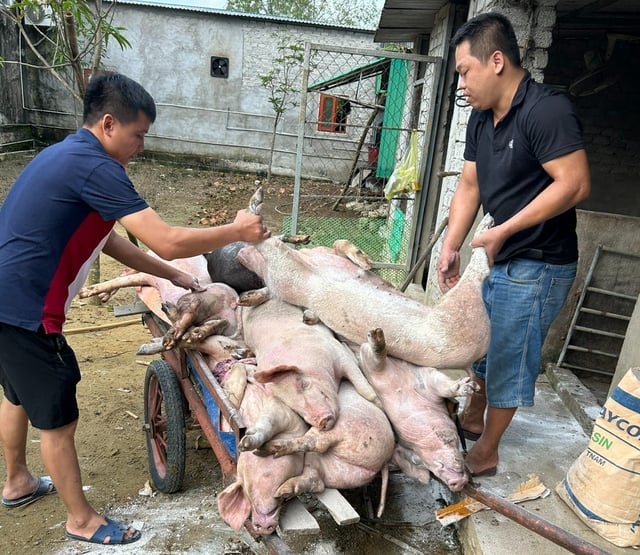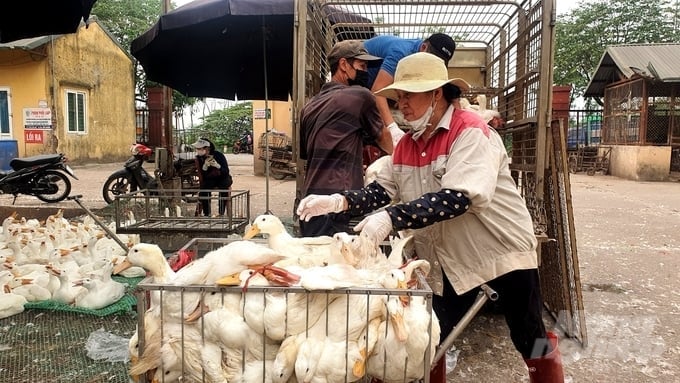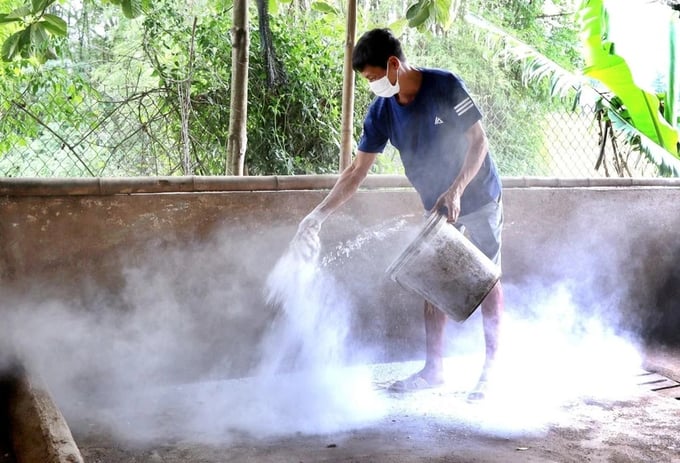June 21, 2025 | 03:35 GMT +7
June 21, 2025 | 03:35 GMT +7
Hotline: 0913.378.918
June 21, 2025 | 03:35 GMT +7
Hotline: 0913.378.918
Prime Minister Pham Minh Chinh recently signed Directive No. 58 on June 16, which requested the focused, coordinated, and effective implementation of measures from relevant stakeholders to control livestock and poultry disease outbreaks. Accordingly, the directive assigned detailed responsibilities to various ministries, sectors, and local governments, thereby emphasizing the accountability of the local leadership.
According to reports from local animal health agencies, outbreaks of African swine fever have been reported in 410 communes across 40 provinces and cities since the beginning of 2024. Consequently, over 17,400 pigs were culled, marking an increase of 53.74% compared to the corresponding period in 2023. Outbreaks of foot-and-mouth disease have been reported in 44 communes across 13 provinces and cities. Thirty-four provinces and cities have reported signs of rabies in their animal populations. Over 60 communes across 9 provinces have reported outbreaks of lumpy skin disease. Seven provinces have reported outbreaks of avian influenza A/H5N1, which resulted in the culling of over 12,000 poultry. Notably, the affected regions reported one human fatality from the A/H5N1 virus, and one case of A/H9N2 virus infection.

Local residents transporting pigs that died from African swine fever to designated areas for disposal.
The risk of disease outbreaks is expected to increase significantly in the near future, severely impacting the food supply, consumer price index (CPI), public health, and the environment.
With the aim of maintaining timely and effective control of livestock and poultry diseases, as well as minimizing their negative impact on local production and livelihoods, the Prime Minister has instructed ministers, heads of relevant agencies, and chairpersons of provincial and municipal People's Committees to focus on the comprehensive, decisive, and effective implementation of disease control measures in compliance with veterinary laws and directives from the Prime Minister. Notably, stakeholders must follow national programs and plans for livestock and poultry disease prevention and control.
Provincial, municipal chairpersons are directly responsible for controlling disease outbreaks, preventing new outbreaks, and managing the disposal of infected or suspected animals. Accordingly, they must proactively implement measures and policies to support farmers affected by diseases in compliance with the law. Additionally, they must promptly detect, prevent, and strictly penalize the trading and transportation of infected animals; and the discarding of animal carcasses that increases the risk of disease transmission and environmental pollution.
Stakeholders are requested to organize livestock and poultry vaccination campaigns in order to achieve a vaccination rate of at least 80% of the current livestock population as soon as possible.
On the other hand, local governments must review and adjust their 2024 livestock and poultry disease prevention plans according to local conditions. Moreover, they must instruct relevant agencies to timely and effectively implement vaccination plans for the local livestock and poultry populations, with a focus on vaccinating against avian influenza, rabies, African swine fever, foot-and-mouth disease, lumpy skin disease, and porcine reproductive and respiratory syndrome.

Provincial and municipal chairpersons must directly supervise and manage local livestock and poultry disease control efforts. Photo: K.Trung.
Specialized agencies are requested to guide farmers in enhancing hygiene measures in order to prevent diseases in their livestock and poultry populations. Local governments must allocate resources to prioritize the establishment of disease-free breeding facilities and zones. They must also promptly address newly detected outbreaks, and strictly penalize individuals who withheld outbreak information or delayed reporting to the local authorities, resulting in disease transmission.
Local governments must organize public information dissemination programs through various forms and content that are tailored to different audiences. This initiative aims to raise awareness and responsibility among the public regarding the risk of outbreaks and disease prevention measures.
Urgent action is required to enhance the capacity of local veterinary systems; maintain the effective deployment of resources for animal disease prevention and control; and prevent the illegal importation and transportation of animals and animal products.
Local governments are advised to establish inspection teams to supervise and promote animal disease prevention and control efforts. Furthermore, they should focus on developing disease-free breeding chains and zones.
Local officials will be held accountable to the Prime Minister if widespread and damaging livestock or poultry outbreaks occur within their jurisdictions.
The Prime Minister has tasked the Ministry of Agriculture and Rural Development with leading and coordinating efforts with various ministries, sectors, and local governments. This task involves focusing on directing, guiding, supervising, and inspecting local animal disease prevention and control efforts. The Ministry of Agriculture and Rural Development must proactively and closely monitor the progress of disease outbreaks in order to promptly detect and provide warnings, as well as comprehensively address outbreaks to prevent widespread disease transmission.

Sanitizing livestock and poultry facilities to prevent disease outbreaks. Photo: Trung Kien.
The Ministry will cooperate with local governments and relevant ministries to promptly detect and strictly penalize the illegal cross-border transportation of animals and animal products into Vietnam; supervise and perform inspections across different regions to promote the effective implementation of national programs and plans for animal disease prevention and control as approved by the Prime Minister; collaborate with international organizations to support disease control efforts, conduct in-depth analysis in animal disease prevention, and expand disease management through online systems.
The Ministry of Health is responsible for providing professional and technical guidance; and coordinating the implementation and monitoring of zoonosis prevention and control measures.
The Ministry of Industry and Trade is responsible for enhancing market management efforts; and proactively detecting and strictly penalizing the transportation and trading of animals and animal products with unverified origins.
The Ministry of Public Security is responsible for instructing relevant agencies and local police forces to cooperate with the Ministry of National Defense, Ministry of Industry and Trade, Ministry of Finance, Ministry of Agriculture and Rural Development, and local governments in preventing and penalizing the transportation and trading of animals and animal products in compliance with the law.
Additionally, the Ministry of National Defense will instruct the Border Guard to closely coordinate with relevant ministries, sectors, and local governments in order to prevent the illegal cross-border transportation of animals and animal products into Vietnam. It will also instruct relevant agencies to support local governments in disseminating information and raising awareness among border residents regarding disease prevention, the dangers of animal diseases, and the risks of trading and transporting non-quarantined, untraceable animal products.
The Ministry of Information and Communications, in collaboration with the Ministry of Agriculture and Rural Development, will promote comprehensive public awareness campaigns regarding the state of disease outbreaks, risk factors, and prevention measures to prevent social panic and encourage proactive disease prevention measures following health and veterinary guidelines.
The Ministry of Finance must promptly allocate funds for animal disease prevention and control efforts as requested by the Ministry of Agriculture and Rural Development, in compliance with legal regulations.
Deputy Prime Minister Tran Luu Quang is directly responsible for supervising and instructing the implementation of the tasks outlined in this directive.
The Government Office is responsible for monitoring and requesting relevant ministries, agencies, and local governments to implement this directive; and reporting arising issues to the Prime Minister.
Translated by Nguyen Hai Long

(VAN) The waste of resources from agricultural by-products and the situation of counterfeit and poor quality goods in production causing losses of thousands of billions were pointed out by the National Assembly deputy.

(VAN) After 5 years of implementation, the CAI initiative has helped coffee growers change their farming practices, moving toward responsible agriculture that meets global export standards.

(VAN) The primary prerequisite for the comprehensive and robust integration of Vietnam's livestock sector into the global value chain is the establishment of a disease control system.

(VAN) The results of national programs are essential for establishing a contemporary livestock sector that is well-equipped to meet the demands of both domestic and international markets, with robust biosafety standards.

(VAN) The UNESCO Global Geopark revalidation of Non nuoc Cao Bang and the transition to a two-tier administrative model are presently undergoing a pivotal moment in Cao Bang, the northernmost province of Vietnam.
/2025/06/13/5330-2-004539_953.jpg)
(VAN) Changing policy mindset and removing investment barriers are urgent requirements to open up new development space for enterprises in the agricultural sector.

(VAN) The areas include the restoration of five million hectares of marine ecosystems.